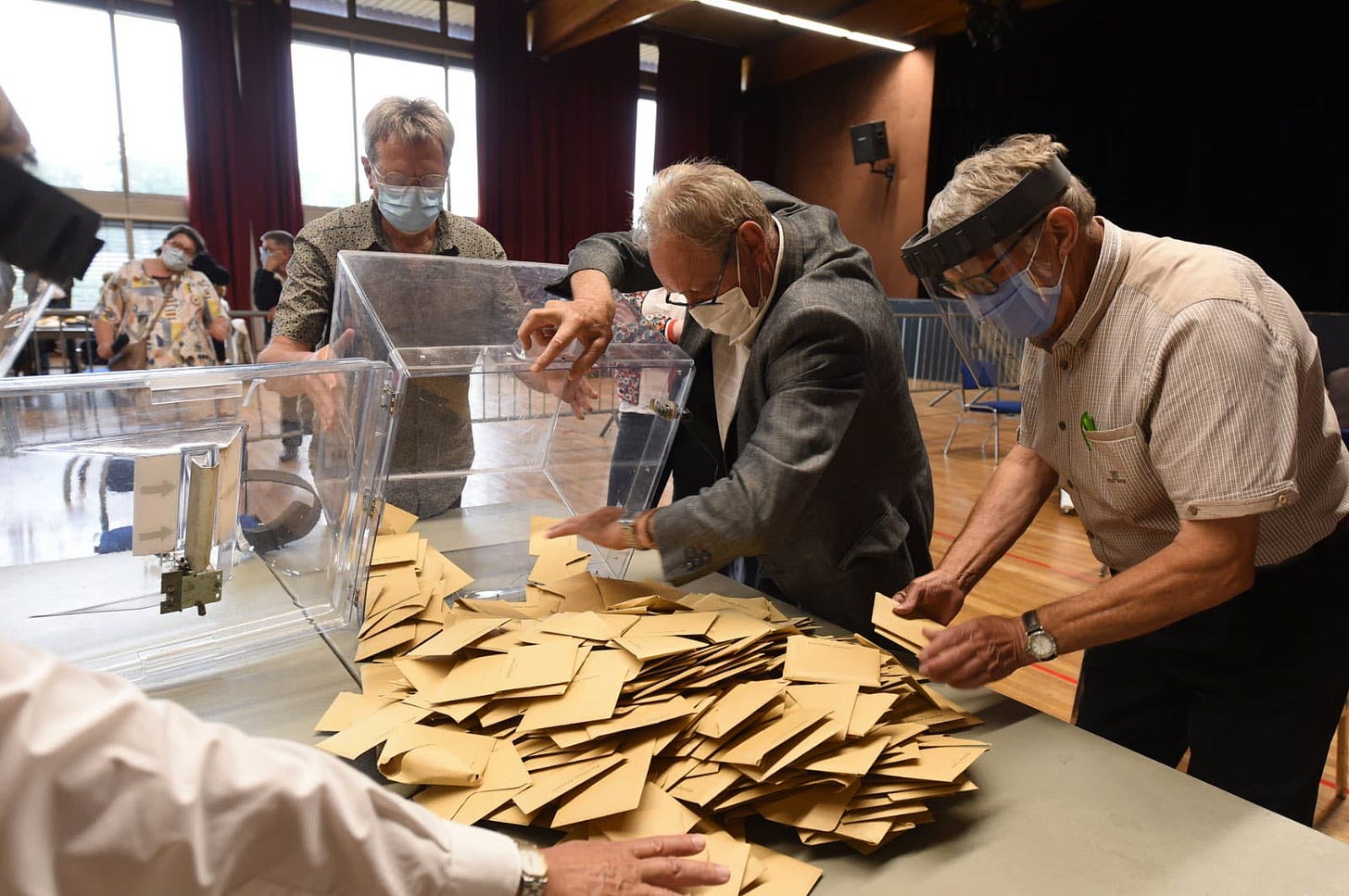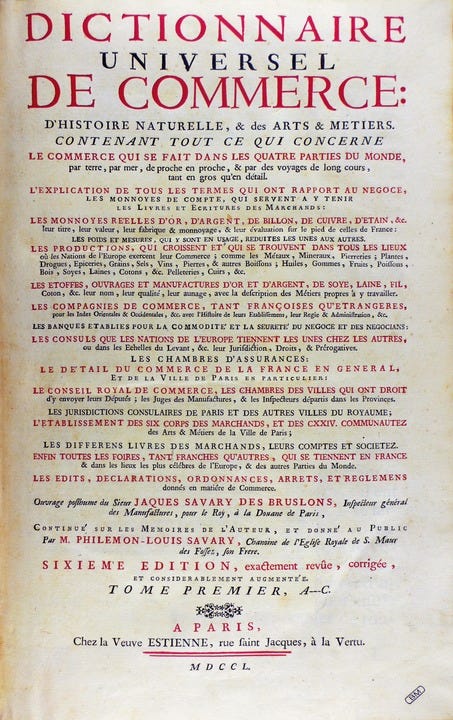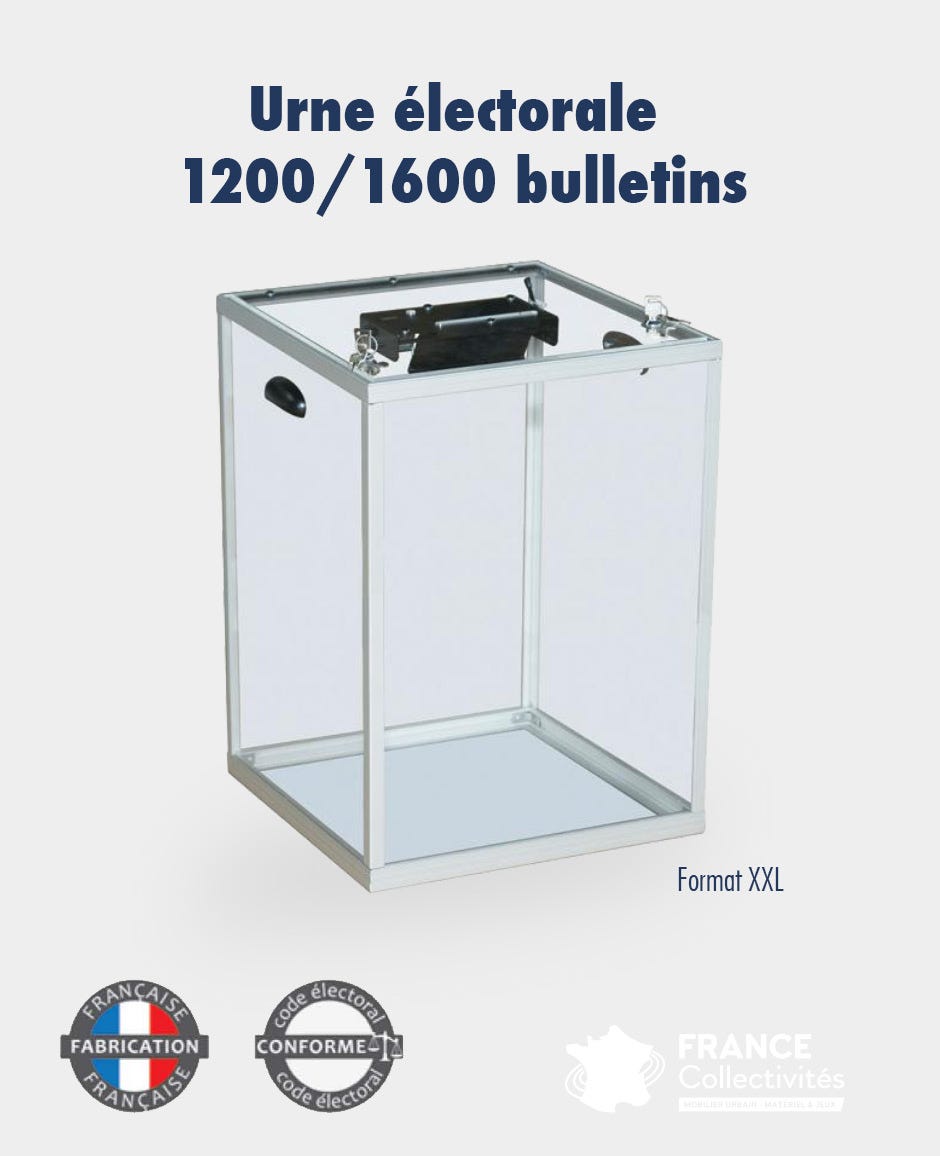A Voté!
LA CAMPAGNE NUMERO UN: the amazing mechanics of an election that spans the entire globe, and a minor point of etymology.
Save the date! Mark your calendars! The French presidential election is upon us!
The first round is scheduled on Sunday April 10, 2022 and the second round is two weeks later on Sunday April 24, 2022. We are 27 weeks or 193 days away from Emmanuel Macron’s reelection.
The French presidential election is a rather convoluted affair: people vote on Sunday, they go to their local polling place or “bureau de vote” (a school, the town hall or another municipal building) and they slip the printed paper ballot inside a thin, blue airmail envelope, and drop it into the ballot box (called the “urne” in French).
At the end of the day, following a very well-choreographed ritual, the “président” of the bureau de vote, often the mayor of the town, opens the box and spreads the envelopes on a big table. Then the “assesseurs,” the sworn representatives of the various candidates, begin overseeing the “dépouillement.” Any voter is allowed by law to attend the count. The envelopes are opened one by one and the small, folded pieces of paper are unfolded and stacked in neat piles. Each ballot is shown to everyone and the name printed on it is announced de vive voix so that everyone in the room can clearly see and hear.

As this is happening, the “secrétaire” of the bureau de vote writes the procès-verbal, that is, the official report of the vote count. If a ballot is scratched, marked with a pen or otherwise altered it is deemed “nul” or void. If there is no ballot in the envelope the vote is counted as “vote blanc” or “blank vote” i.e. none of the above. Since 2014 votes blancs are no longer tallied as void. They are counted separately. For instance in the second round of the 2017 election, blank and void ballots reached a record 11.47% or 4,066,802 votes, including 8.51% blank.
You’ll notice the word Dépouillement. It may sound like “delousing” but it is not. The verb for delousing is épouiller. Dépouiller comes from another root, despollier, the action of getting rid of one’s clothes, or denuding oneself. For instance, the great 17th century theologian Saint François de Sales speaks of dépouillement as renouncing worldly possessions for the sake of faith. By extension, se dépouiller, as in humbling oneself before God, became a common locution among Jansenists and other religious mystics of the time. Intriguingly, la dépouille, the feminine case of le dépouillement, is an idiom for the body of the dead, stripped of everything – clothes, possessions, life. Meanwhile, in argot, or popular parlance, dépouiller still means stealing objects of value from someone.
The modern use of dépouiller, in the specific sense of tallying, comes to us by way of Jacques Savary des Brûlons’ Dictionnaire Universel de Commerce, first published in 1723. In that landmark work of mercantile lexicography, a how-to guide for the entrepreneur, the royal customs inspector Savary defines Dépouiller as taking inventory, counting the merchandise and objects in a given entrepôt or a bankrupt business. The idea is to count it piece by piece to discover its true value.
Savary was not conjuring up words from thin air but rather reporting and making public the language of the commercial trade for whomever wanted to join in. Dépouiller was merchants’ slang for putting a detailed price on spoils.
And so the dépouillement is both the physical manipulation by which the ballots are taken out of their envelopes, stripped and revealed, and the abstract arithmetic procedure by which they are added and turned into quantities.
It takes a lot of logistics to let every citizen vote. In the last presidential election in 2017 there were 66,546 bureaux de vote on French soil and 864 abroad for exactly 47, 582, 183 registered voters. For the first round, one billion ballots were printed on 1300 tons of paper (recycled, apparently). Every candidate from the most famous to the most obscure must have an equal number of available ballots.
The République is universal and therefore spans the entire planet. Electoral material must be shipped to the four corners of the globe. That is how I ended up voting in Burbank, in the heart of the San Fernando Valley, of all places.
The first polling station opens at noon on Saturday in the archipelago of Saint Pierre et Miquelon, off the coast of Terre Neuve. Martinique, Guadeloupe, Guyane and the other Antilles start voting at 1PM on Saturday local time as well. In Polynesia, from Taputapuatea all the way to Hiva Oa and Rapa Iti, the 236 polling stations in the 48 municipalities open Saturday morning at 9AM local time and close in the evening. In Mayotte and Réunion the vote is held on Sunday. In the TAAFs (Terres Australes et Antarctiques de la France) it is not entirely clear how the vote takes place. I would love to know how the people in the Kerguelen islands or at the Dumont D’Urville base do it. In Kanaky-Nouvelle Calédonie and Wallis and Futuna, the vote takes place on Sunday.
There are no machines, no early voting nor any fancy thing of that sort. Mail-in voting is prohibited except in very rare cases (e.g. detainees whose sentence is not final.) Instead, you can sign a “procuration” to empower somebody else to vote in your place, but it is a cumbersome and heavily scrutinized process. It has been shown that such procedure is used mostly by people with higher levels of education, in other words it is largely a vote along class lines. Per the interior ministry, there were 2,7M requests for the 2017 presidential election (about 5% of eligible voters).
Most show up at their designated bureau de vote with their ID card or passport and their carte d’électeur. These are issued by the commune or municipality where you registered to vote. It is proof that you are legally allowed to vote and that you are on the official rolls. They are sent by mail, which is an additional way to verify that you are legit. When you vote, you must sign your name in indelible ink on the “liste d’émargement,” the actual voter roll where your name, first name, date of birth and address are listed. There used to be a lot of fraud in local elections, where voters were paid by various political machines to list fictitious addresses within a given commune so as to pad the totals of this or that local cacique. This is less of an issue in presidential elections, since you vote for one national candidate.
All the bureaux de vote close at 7PM, with the exception of some in major cities where they close at 8PM. The dépouillement begins instantly, and results are sent up to the interior ministry as soon they’re certified and agreed upon. No results are revealed before the close of the last bureau de vote, at 8PM. That means that votes from far away territories are usually the first ones to drop. This presents a slight challenge for exit polls and modelers because the big cities come in last. However, the final results are known within two to three hours. The secret is the number of bureaux de vote: there’s one for every 1,000 French citizen or so.
After the dépouillement there is often a pot, meaning some wine, cheese and snacks to thank those who toiled to make it happen. It can be amicable, even festive, or it can end up in acrimony depending on the mood and who won or lost. A certain decorum is normally maintained as the presidential election is the cornerstone of French civic life. Nobody breaks into songs or gets drunk (at least I have never heard of such incidents).
The presidential election verges on the sacred. It is the closest the République gets to organizing a religious ceremony. Elections are held on Sunday, the Christian sabbath, the day of rest. The officiating people are always very serious and solemn. If the président of the polling place happens to be a mayor, she can wears her tricolor sash. A hushed silence is enforced throughout the day as voters go into the “isoloir” to cast their ballot: usually a booth made of cloth that you enter by pulling a curtain. It is set up as an ecclesial space, almost like a confessional. It encourages you to engage into a sort of intimate, introspective dialogue, or at least pretend to, for their is no priest on the other side to dispense absolution. This entire scenic arrangement instills awe and respect for the manifestation of the general will, the renewed, scheduled miracle of elective democracy.
The président of the bureau de vote stands by the big box. It has a slit on top in which you drop your envelope. The officer keeps it closed until you are ready. You motion towards it, envelope in hand, your arm extended. Then the président opens it. Urnes used to be equipped with a knob and a sliding mechanism, but more often than not the président keeps it closed with a book (say, a red jacket copy of the Code Civil) or a mere sheet of paper. You sign your name on the list, your electoral card is stamped, the box opens, you drop the envelope.
The secrétaire announces “A voté!” and that is that.
Today’s song is by the one and only Léo Ferré







I heard your interview on A New Paris and it made me interested in knowing more about France than the easily accessible Francophile information. I look forward to reading your posts as you go along.